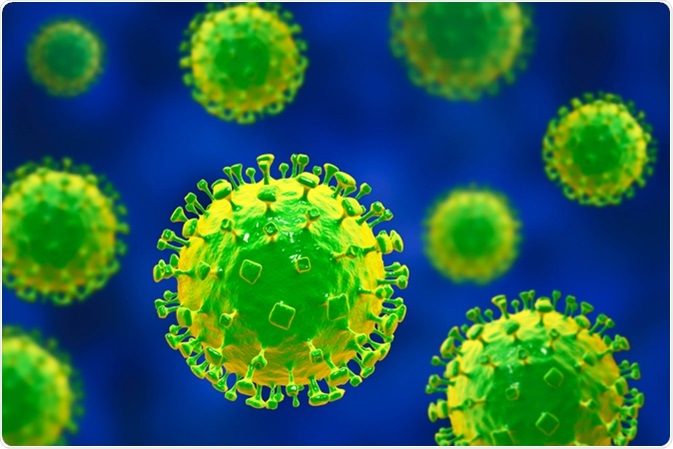The Nipah virus is a Henipavirus belonging to the paramyxovirus family. It causes encephalitis, which is fatal in over half of all the cases. The first outbreak to be observed was in Malaysia and Singapore, during the period 1998-99. These were followed by outbreaks in Bangladesh.

Nipah virus, newly emerging zoonotic infection with acute respiratory syndrome and severe encephalitis, 3D illustration. Image Credit: Kateryna Kon / Shutterstock
Signs and symptoms showed some differences in the outbreaks in various places. In Malaysia, neurological symptoms were more common, but respiratory symptoms were also prominent in more cases during the Bangladesh outbreak.
Concern over Nipah virus outbreak in India grows
Clinical Presentation of Nipah Virus Infection
The most common manifestation of Nipah infection is a severe form of encephalitis, or brain inflammation, which progresses rapidly. The first symptoms begin after an incubation period of 3-14 days, but in some cases it may appear after a period of up to 2 months. However, over 90% of patients have a history of two weeks or less before the appearance of the first symptoms.
The symptoms of primary infection consist of:
- high fever (103°F–105°F, or 39.4°C–49.6°C) in 100% of patients
- signs of mental confusion and/or unconsciousness in 90% of cases
- severe headache, typically in the occipital region in almost 75% of cases
- severe weakness in 67% of cases
- dizziness
- vomiting
- rapid onset of persistent drowsiness and disorientation
- convulsions in 23% of cases
- diarrhea in about 30% of cases
- evidence of the brainstem involvement
In severe cases, rapid progression to coma occurred within 48 hours or less. On the other hand, in early infection, many patients also showed respiratory symptoms such as cough and respiratory difficulty, in about 70% of patients (and over 75% in the later outbreaks). These may also accompany the neurological manifestations in 50% of cases.
Disease Prognosis
Nipah virus infection proved fatal in about 40% of cases, in the Malaysian outbreak, depending on the extent of brainstem involvement and accompanying chronic conditions such as diabetes mellitus, as well as the level of intensive medical care available.
Other prognostic factors in the Bangladesh and India outbreaks involved the presence of respiratory difficulty, and absent plantar reflexes. Subclinical infection was noted in about 8-15% of cases.
In later outbreaks in Bangladesh and Siliguri (India), the case fatality was noted to be as high as 75%. The latter outbreak was marked by symptoms such as myalgia (especially in the calf muscles), vomiting, slurring of speech, altered sensorium, and prominent respiratory symptoms ranging from rapid breathing or tachypnea to acute respiratory distress, as well as seizures or involuntary movements (typically facial twitches). This was seen in addition to the classic fever and headache.
Another finding was normal blood pressure at the time of admission which increased as the illness worsened and became fatal.
Death occurred typically within a week of the appearance of symptoms, but earlier in the index cases (2-3 days).
The chronic sequelae of Nipah virus infection include:
- Reactivation of Nipah virus which remained latent in the body, and even death, which occurred in a fraction of patients who suffered relapses or developed encephalitis years after the initial exposure to the infection and their recovery from it;
- Of those who recovered, one in five had chronic neurological problems such as repeated seizures or changes in personality.
Further Reading
Last Updated: Feb 27, 2019